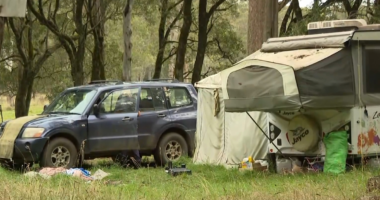Share this @internewscast.com
Inset: Jeana Flores (Facebook). Background: The area where Jeana Flores’ body was found after she was mowed down and killed by a hit-and-run driver in California (KRON/YouTube).
A heartbreaking incident unfolded in Northern California where a teenager lost her life in a hit-and-run accident while she was on her way home after doing laundry at a family member’s house. Jeana Flores, 17, had just sent a poignant text to her stepmother, stating, “Tonight I finally saw the Little Dipper,” moments before the tragedy.
Jeana’s body was discovered early Friday morning, around 3:30 a.m., lying along a road in Antioch near the Contra Costa County Fairgrounds. The specific location was L Street, between West 18th and West 10th streets, as reported in a police press release describing the event as a “hit-and-run” incident.
Upon arriving at the scene, officers attempted to provide medical assistance to Jeana, but sadly, their efforts could not save her. Based on initial evidence and observations, the circumstances of her death are being treated as “suspicious.” Jeana’s family shared with local news channels KTVU and KGO that Jeana was walking home late that evening after visiting a relative’s home for laundry.
Her uncle revealed that a dispute had taken place between Jeana and her boyfriend earlier that evening.
“She was on her way home after doing laundry,” Elias Flores, Jeana’s uncle, informed KGO. “She had an argument with her boyfriend and decided to walk home.”
The family was informed by police that Jeana was struck by the vehicle sometime after 9:30 p.m., coinciding with the time she sent her last message to her stepmom, Jenna Lee.
“Tonight, I finally saw the Little Dipper,” Jeana told Lee, per KTVU.
An autopsy conducted by the Contra Costa County Coroner’s Office determined that Jeana died from injuries sustained from a high-impact vehicle collision.
“Her spine was broken,” said Joseph Flores, Jeana’s father, in an interview with KTVU. “You have to hit someone hella hard for her spine to be broken … and then left her like that.”
The grieving dad added, “How do you register that? You can’t. I’m still in denial.”
Jeana’s family says she was just three blocks from home when she was struck, according to KTVU. The teen was in the process of enrolling in Job Corps at Treasure Island, where she was interested in training as a chef.
“There needs to be justice for her,” Jeana’s dad said. “She was only 17. She just started life.”
Elias Flores told KGO, “She was trying to become a chef. That was her dream. That was her goal.” He noted on Facebook how Jeana “called a few weeks back asking advice on how to get closer to God,” according to a post.
“She asked if I would call her and keep her accountable about praying and reading the Bible,” Elias Flores said in the post.
Police were still investigating Wednesday and searching for the driver who was responsible.
“For you to take her life away and have no guilt … turn yourself in,” Lee told KTVU. “I don’t get it.”

















